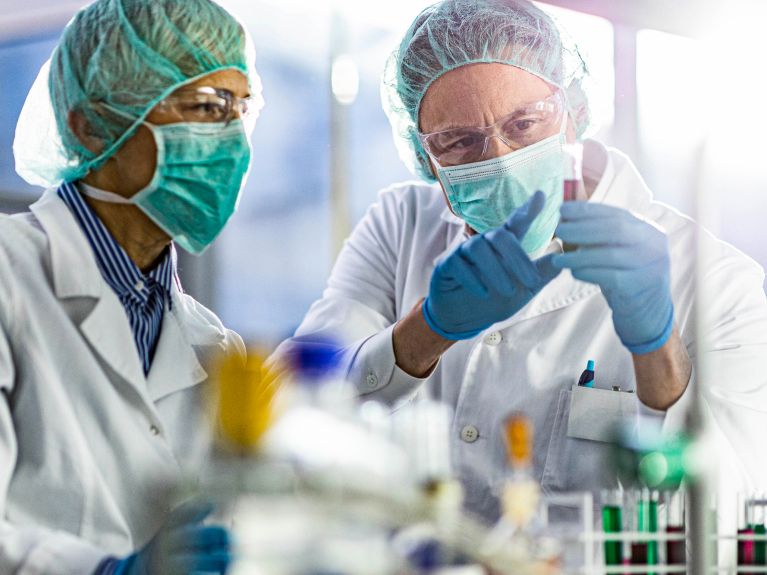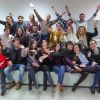Partner in research
Cooperation in science and medicine plays an important role in German-Israeli relations – we present an overview.

It was in the mid-1960s that the thriving German-Israeli relations in the fields of science, medicine and technology led to the first concrete collaborative projects. To this day they remain the foundation for intensive cooperation, inspiring renewed exchange at all kinds of different levels time and again – at the ministerial and national levels, between universities and research institutes, or between individual researchers in the two countries.
Cooperation between ministries
Cooperation between the research ministries in Germany and Israel began in 1973 and in its first 30 years alone made several hundred projects possible, above all in the areas of biotechnology, energy and environmental research, marine and geoscience, medical research and laser technology. Even today the ministries generate impetus through their joint activities – giving rise for example to the German-Israeli Year of Science and Technology 2008. Ever since, the website www.cogeril.de has served as an information portal for anyone interested in bilateral cooperation and the opportunities for funding in this context. From 2011, the scientific cooperation between the two countries was further intensified by the first German-Israeli Research Forum and by agreements signed in the subsequent years.
More information can be found here.
Minerva programmes
Project support, individual exchange and the creation of research centres are the three levels on which the Minerva-Stiftung has been supporting and expanding German-Israeli scientific cooperation for over 50 years. With finance provided by Germany’s Federal Ministry of Education and Research, the Minerva Weizmann project programme has been funding joint basic research projects in physics, biology, chemistry and mathematics at the Weizmann Institute of Science since 1964. Another programme awards around 50 scholarships each year to doctoral students and postdocs from both countries with a view to intensifying bilateral exchange. Furthermore, top-class scientific research in various fields of the natural and social sciences and the humanities has been conducted at over 20 Minerva research centres since 1975.
More information can be found here.
German-Israeli Project Cooperation (DIP)
Thanks to funding made available by the German-Israeli Project Cooperation (DIP), three to four joint projects with a maximum duration of five years can be realised per year. Run by the Deutsche Forschungsgemeinschaft (DFG, German Research Foundation) since 2008, the programme is targeted at seven Israeli universities and research institutions. The focus is on German-Israeli cooperation in the natural and life sciences and the humanities. The DIP has made over 77 projects possible to date.
More information can be found here.
German-Israeli Foundation for Scientific Research and Development (G.I.F.)
Since 1986, the G.I.F. has funded cooperative studies involving German and Israeli researchers in all scientific disciplines. The distinctive feature of this Jerusalem-based foundation is that ministries in Germany and Israel share equal responsibility for financing, management and decision-making. Their objective is to promote basic and applied scientific research for peaceful civilian purposes, conducted by teams of scientists from both countries for a period of three years. Alongside its regular funding programme, the G.I.F. has been providing annual grants for outstanding young scientists since 2000. As per the end of 2018, the foundation had supported 1,444 bilateral projects in its regular programme and 494 cooperative ventures in its young researcher programme.
More information can be found here.
The Martin Buber Society of Fellows in the Humanities and Social Sciences
The humanities, cultural and social sciences have been supported since 2010 by the Martin Buber Society of Fellows at the Hebrew University of Jerusalem. Funding is available for postdocs from both countries, and also on a limited scale for doctoral students. Each year, five scholarships are awarded for up to four years of research. The aim is to foster top-class research, with the programme’s pronounced interdisciplinary orientation lending additional support. The overriding goal is to create a lasting community of scientists who learn from and inspire one another.
More information can be found here.
Healthcare apps and telemedicine, hospitals without an address and patient self-determination are the buzzwords that will become increasingly important in research cooperation with Israel over the next five years.
Other agreements and grants
The DFG, the Humboldt Foundation and the Volkswagen Foundation additionally support bilateral science projects, research travel and joint conferences through other programmes of their own, as well as granting scholarships. New funding programmes are also being rolled out frequently to respond to further demand for more German-Israeli research cooperation. For example, the cooperation programme in industrial research and development (DIIK) has been providing targeted funding for projects in electronics, information and communication technology, biotechnology, material sciences and environmental technology since 2000.
Innovation, digitisation, healthcare 2020
The Act to Improve Healthcare Provision through Digitalisation and Innovation (Digital Healthcare Act – DVG), which entered into force in Germany at the end of 2019, will further intensify research cooperation with Israel in the area of healthcare research. The aim is to provide patients with better healthcare more quickly through digitisation and artificial intelligence. One example are healthcare apps designed to significantly improve patients’ quality of life.
To this end, basic research must first be linked with innovative companies. The university hospital Charité-Universitätsmedizin Berlin and the Berlin Institute of Health (BIH) believe that cooperation with the National Technological Innovation Authority of the State of Israel (Israel Innovation Authority) is the way forward. “Israel is the world’s number one country when it comes to start-ups”, explains Dr Sein Schmidt. He is the scientific and medical director of the BIH Clinical Study Center (CSC), a joint BIH and Charité institution that coordinates the partnership agreed in 2019.
One initial step for example was an exchange with some 300 Israeli start-ups about new collaborative ideas relating to forward-looking therapies and diagnostics. “We are embarking on completely new paths with Israel”, says Schmidt. “Healthcare apps and telemedicine, hospitals without an address and patient self-determination are the buzzwords that will become increasingly important in research cooperation with Israel over the next five years.”
More information can be found here.


